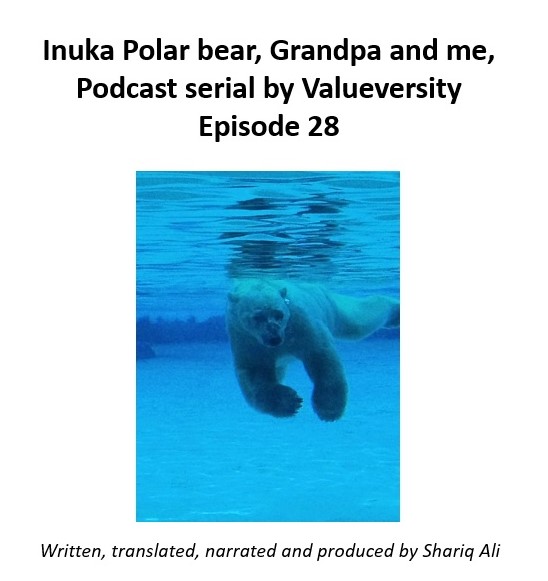Inuka is the star of the Frozen Tundra of Singapore Zoo. In this story, enjoy the adventures of Polar bears in the arctic.
We both looked into each other’s eyes in the nose to nose proximity. Yani Apa was talking about her holiday in Singapore last year. On one side of the transparent glass wall were the spectators including me. On the other side was Inuka, busy swimming in an icy water-filled pool. He then stopped and stood in front of me for a second. Mine and his nose were touching the separating glass wall, and we exchanged an intimate gaze. Tundra is the name given to a section of Singapore zoo. The natural environment for the polar bears. A small artificial Arctic. Inuka was born there. He is the first polar bear born in a temperate country. When born, his weight was equal to two oranges. And now, twenty-three years later weighs about five hundred kilos. The world’s largest carnivore. Besides 20 kg of fish daily, he eats plenty of vegetables and fruits. He has a four-inch fat layer underneath thick white fur. This keeps the body warm in icy deserts and frozen oceans. In his lunchtime show, keeper throws five kilo live fishes into the water. Inuka’s masterful pursuit and the hunt of these fishes was a sight to behold. Before I watched this show, I had read the Polar Bear booklet. By the time we reached the hotel, I felt exhausted and sleepy. That night I had a strange dream. Somehow Inuka has escaped a clown-like life in the zoo. He is now a free soul in his home country of the Arctic. Our friendship continues. I wear skates, and he barefooted wanders miles in the snowy desert. Enjoy the exciting snowy wilderness, extremes of chilly weather and unique arctic landscapes. Inuka can smell the seal fish from a mile’s distance. Then we sit and wait on the ice rocks floating in the cool waters of the Arctic Ocean. When the seal fish, as big as Inuka, rises above the water level to breathe. He jumps and grabs the prey with forty-two dagger-shaped teeth in his jaw. Then Inuka and his companion polar bears enjoy their favourite food. Then wandering alone for hundreds of miles in the snowy desert in search of the next prey. Then on a cold moonlit night, I empathize with the sad reality of their lives. Climate change is melting the Arctic’s icy deserts and oceans. Hunting and procreation grounds are becoming tight for these Polar Bears. There are only two hundred thousand of them remaining in this world now. Countless perished because of the lack of hunt in icy deserts … To be continued
